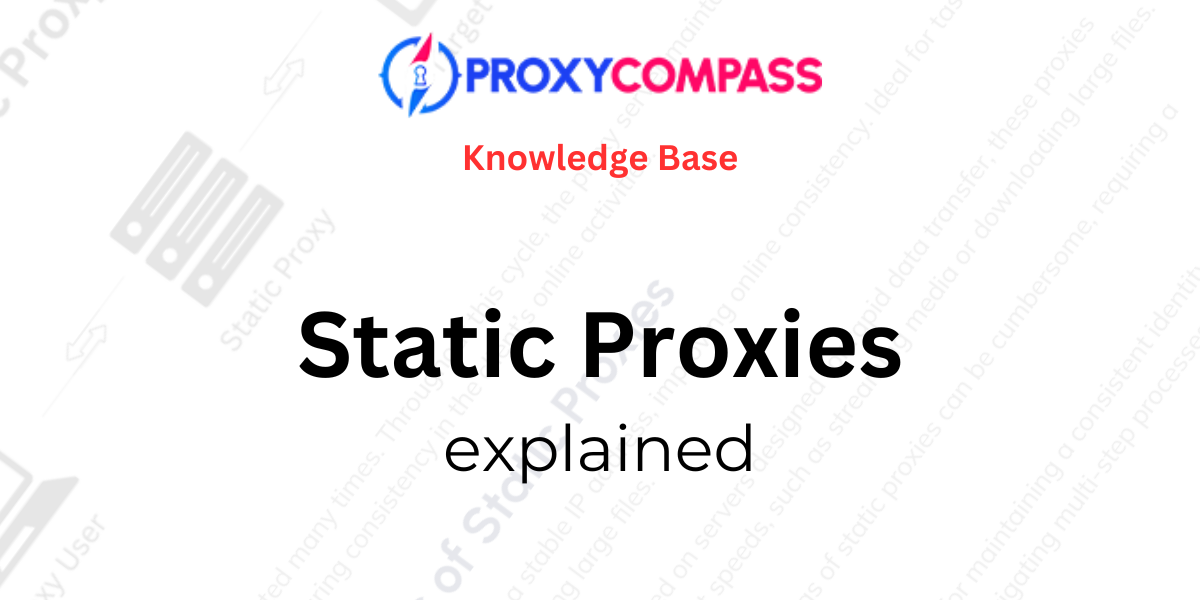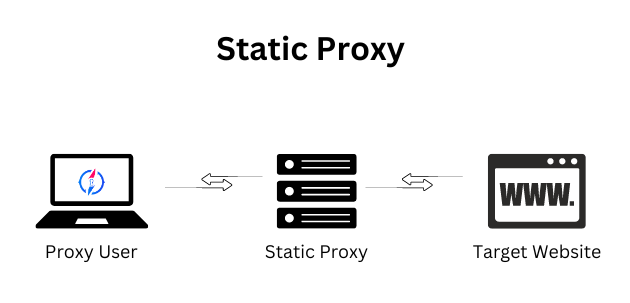Static Proxies Explained

In this article, you will learn what static proxies are, what types are available, how they differ from dynamic (rotating) proxies, and what tasks they are and are not suitable for.
We'll also cover their physical location, the types of IP addresses they use, and the pros and cons of using static proxies.
In addition, we will discuss what to consider when ordering them and what to expect when purchasing access to static proxy services from ProxyCompass.
Need stable static proxies for your business?
See our pricing for static proxy.
What are Static Proxies?
Static proxies, also known as permanent, unchanging, or fixed IP proxies, use IP addresses that remain constant for long periods of time, often a month or more.
They provide a fixed IP that does not change, providing a consistent online identity even if your own IP is dynamic.
This stability is in contrast to rotating proxies, which change IPs frequently to increase anonymity. Static proxies are particularly valuable for activities that require a stable Internet presence.
How Do Static Proxies Work?
The client sends a request to the proxy server, which forwards it to the target website.
The website responds back to the proxy, and this interaction is relayed back to the client.

This process is repeated many times. Throughout this cycle, the proxy server maintains the same IP address over time, ensuring consistency in the client's online activities.
Characteristics of Static Proxies
Steady IP: Static proxies provide a stable IP address, improving online consistency. Ideal for tasks such as streaming content or downloading large files.
High-speed connectivity: Typically hosted on servers designed for rapid data transfer, these proxies facilitate activities that require fast Internet speeds, such as streaming media or downloading large files.
Fixed location: Changing the geographic settings of static proxies can be cumbersome, requiring a selection based on your specific location needs.
Ideal for Continuous Identity: Static proxies are ideal for maintaining a consistent identity over time, which is critical when managing multiple accounts or navigating multi-step processes such as online shopping.
Different Types of Static Proxies
Static proxy servers can be categorized into several main types based on their origin.
Data Center Hosted Static Proxies
Data center hosted static proxies are the most common type of static proxy, known for their speed, stability, and cost-effectiveness.
Clients are not charged based on the amount of data processed, but rather on the number of IP addresses used.
The main advantages of these proxies are their affordability and reliability, high connection speeds, constant availability, and the absence of charges based on the amount of uploaded and downloaded traffic.
However, their main disadvantage is the lack of complete anonymity, as their IP addresses are owned by the hosting providers and can be more easily identified and potentially blocked by major e-commerce sites such as Amazon, eBay, and Booking.com.
Learn more about data center hosted proxies.
Residential Static Proxies
Residential static proxies, also known as ISP proxies, are a more expensive type of static proxy. Unlike data center proxies, their IP addresses belong to residential Internet service providers (ISPs). They are comparable to data center proxies in terms of speed and connection stability.
The advantage of ISP proxies is that their IPs are generally more trusted due to their association with residential ISPs, resulting in fewer blocks and captchas.
However, their main disadvantage is their higher cost.
Learn more about residential proxies.
Mobile Static Proxies
Mobile static proxies are essentially non-existent due to the nature of mobile IP addresses, which cannot be maintained by a single user for long periods of time. Mobile network operators periodically change the IP addresses assigned to each SIM card.
In mobile proxy farms, mobile proxy providers may offer a compromise known as "sticky IP", which allows a mobile proxy user to temporarily fix an IP address for a short period of time-typically 10-30 minutes and rarely up to an hour.
Therefore, calling a mobile proxy "static" is a bit of a stretch.
Learn more about mobile proxies.
Free or Public Static Proxies
Free or public static proxies are often servers or home computers that have become externally accessible due to misconfiguration or virus infection.
These proxies should not be considered reliable tools for serious tasks due to their unpredictable nature and potential security risks. They may provide temporary solutions for less critical applications, but don't expect them to provide fast or secure service.
The length of time a free proxy will maintain its IP address is unpredictable.
Learn more about free proxies.
When to Use Static Proxies
Static proxies are ideal for activities that require a consistent online identity. They provide uninterrupted access by maintaining a stable IP address, which is essential for logging into websites without repeatedly entering credentials. This makes them ideal for managing multiple accounts, web crawling for SEO purposes, streaming media, downloading large files, and navigating multi-step processes such as online shopping checkout. Static proxies help maintain anonymity while allowing users to perform these tasks efficiently.
When Not to Use Static Proxies
Static proxies may not be appropriate for tasks that require frequent changes in proxy settings, such as location adjustments. They are also less effective for scraping large amounts of data from dynamic websites in industries such as e-commerce, travel, and hospitality.
In addition, tasks that require continuous IP address changes to maintain anonymity are better served by using rotating proxies rather than static ones.
Static Proxies at ProxyCompass: What to Expect
As a customer of Proxy Compass, you get access to static proxy servers based on the selected number of proxies in the package and the geographical location according to the Ripe.net database.
Rental period for static proxies: The minimum rental period is one month. The list of IP addresses remains the same during the rental period. When renewing this package, the list of IP addresses will be carried over to the following months without any changes.
Optional list update: Customers can do an optional update of their IP address list. This option is available every 8 days and can be accessed by clicking the "Get new IP" button in the client's control panel.
Protocol support: Each proxy in the client's list supports all major protocols, including HTTP/HTTPS and SOCKS4/SOCKS5. Clients can use each proxy for all protocols simultaneously without switching or additional configuration.
 Static proxies are available for simultaneous use over both SOCKS5 and HTTP/S protocols.
Static proxies are available for simultaneous use over both SOCKS5 and HTTP/S protocols.Proxy Authentication: The authentication method is based on the client's IP address. When enabling a package of static proxies, the client must enter the IP address of the device from which they need to access the proxy in the special "Binding IP" field.
Access to the list of static proxies: Clients can download the list of their proxies in advance or access it through the API. Additionally, the API allows to retrieve random IPs from the available list.
https://proxycompass.com/knowledge-base/static-proxies-explained/
Comments
Post a Comment